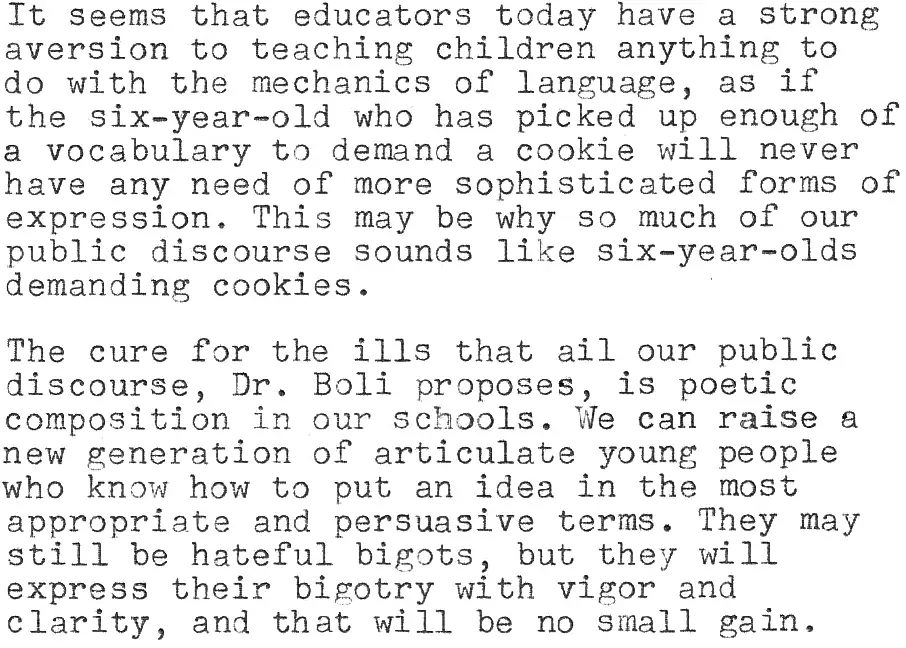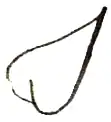



Transcribed below. The typewriter is a 1950 Underwood Rhythm Touch.
A Poetical Education.
Over at the Celebrated Magazine, we spent the whole month of February writing a poem a day for International Anything-But-Haiku Month. The rules were simple: write a poem a day in any form other than haiku.
What great lesson did we learn from the experience?
First, it should be obvious that writing a poem a day is no big deal. Writing a good poem every day would be another matter, but we gave ourselves permission to publish bad poems.
Second, it should be just as clear that poetry is a skill that can be learned. Good poetry, again, may be a different thing: perhaps no amount of training can take the place of native genius to produce a memorable poet. But an acceptable poet, a poet who produces something recognizable as poetry and not just prose hacked into lines, can be made out of ordinary materials. It is very helpful if the subject already has a sense of rhythm and can hear the accents of words, which it appears many people cannot do; but even without those natural gifts it is possible to approach a poem as a purely intellectual exercise, in which following certain rules produces certain results, and the rules can be known by consulting a dictionary.
These observations suggest that the composition of poetry could be a useful exercise for children in school. Dr. Boli does not mean “poetry” as it is commonly accepted today, where the child is encouraged to write his true feelings in a few lines of random length, so that the only intellectual exercise comes from having to fabricate some true feelings to write. No, it should be poetry where the form is dictated very strictly, and where half-rhymes are counted as failures.
Why would that be a good thing for children? Well, first of all, it might accidentally unearth a few good poets, Every year, a few of our children discover that they are very good at mathematics, and that is how we get our brilliant scientists. Every year, a few discover that they have a gift for music, and we have another generation of musicians. How will we raise up poets if our children never have the opportunity to try their hands at poetry? Only if we give them a chance to make poems will we find out which ones ought to be encouraged to enter the lucrative and adventure-filled international poetry business.
But secondly, and much more importantly, children would learn more about thinking from writing formal poetry than they would learn from almost any other form of education.
Think what happens when we speak in prose. We stumble through our sentences, trusting in luck to get us through to the end; we begin a thought with no clear idea of how it will look by the time it is finished; we leave it to the charity of our listeners to fill in the connections we have left unexpressed. In short, we are slobs, and because of that we are not interesting or persuasive. We transfer those habits to our writing, as a glance at most of the written material that meets our eves will confirm.
But what happens when we turn to formal poetry? Every word must fit the meter; the words at the ends of lines must rhyme appropriately; and yet, unless we are deliberately writing nonsense—a discipline that demands even firmer control of our thoughts and an even more logical development of our illogic—the lines must express and develop an idea. This means that words must be carefully chosen for both their sound and their sense.
As a first benefit, think how those requirements impose an enlargement of the vocabulary! We must go searching for other words than the first vague terms that come to mind. Think, also, how it makes us aware of the structure of our sentences. We cannot fill our verses just by beginning a thought and hoping it will form itself somehow along the way. Writing a poem with meter and rhyme demands that we pay attention to the structure and the content in equal measure, whereas in our ordinary speaking and writing we often find ourselves neglecting both.
This is important to understand, because the first objection that would be raised to teaching formal poetry in schools would be that it is of no practical value. But that is like saying that practicing scales is of no value to a musician, because no one ever stands up on a stage and performs a scale. It is not for the sake of performing scales that musicians practice scales; it is for the sake of gaining skill that will make their performances effortless. Likewise, it may be true that few of the children in our schools will grow up to be poets, but all of them will grow up to be communicators of one sort or another. All of them will find themselves having to convey an idea to someone else, and the ones who can do it persuasively and memorably will have a decided practical advantage over the ones who drift through their sentences with an occasional glancing blow at their meaning.
It seems that educators today have a strong aversion to teaching children anything to do with the mechanics of language, as if the six-year-old who has picked up enough of a vocabulary to demand a cookie will never have any need of more sophisticated forms of expression. This may be why so much of our public discourse sounds like six-year-olds demanding cookies.
The cure for the ills that ail our public discourse, Dr. Boli proposes, is poetic composition in our schools. We can raise a new generation of articulate young people who know how to put an idea in the most appropriate and persuasive terms. They may still be hateful bigots, but they will express their bigotry with vigor and clarity, and that will be no small gain.

Leave a Reply